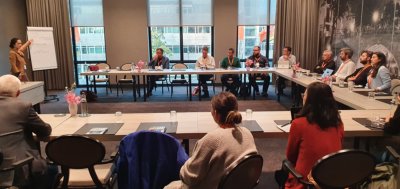On November 14, 2022, our annual Community Day took place at the Van der Valk Hotel in Utrecht with the participation of about 50 researchers. The day started with a networking lunch followed by a short presentation by Mark van den Brand (TU/e) with some great results from NIRICT over the past year.
The key goal of 4TU.NIRICT is to strengthen and support collaboration among researchers and practitioners of the 4TU institutes working in the ICT domain, but another important goal is to increase Diversity, Equity and Inclusion (DEI) within the 4TU.NIRICT community. To pay attention to this, Alexander Serebrenik (TU/e) and Cristina Zaga (University of Twente) both gave a presentation about the importance of DEI in the ICT Community.
After these plenary presentations, the group was divided into three according to the three themes of the day, Energy and ICT, Health and ICT and Agriculture and ICT, with the idea to bring NIRICT researchers together to discuss and to explore per theme the opportunities for interdisciplinary collaboration. The themes are related to the societal challenges we are currently facing and require interdisciplinary effort in order to be addressed effectively.
Energy and ICT sessions
With the participation of around 25 researchers, Energy and ICT session chaired by Suzan Bayhan hosted five pitches delivered by Mathijs de Weerdt (TU Delft), Vasilios Andrikopoulos (University of Groningen) , Suzan Bayhan (University of Twente), Tarek Alskaif (WUR), and Marc Geilen (TU/e). The talks covered “energy” aspects from various perspectives: from how AI and digitalization can play a role for energy transition towards a more sustainable energy infrastructure to techniques for realizing edge AI on ultra low-power devices and to decrease the energy-footprint and emissions of the ICT infrastructures. Discussions following the pitches pointed to the need for systems thinking and collaboration among researchers from different disciplines to develop technical solutions and to ensure acceptance by the public and private parties to adapt to the changes. While the participants agreed on the key role and potential of ICT in moving to a more sustainable energy and digital infrastructures, they also pointed out to the need for change in regulations and law for realizing the developed technical solutions at scale.
Health and ICT sessions
With the participation of around 20 researchers, Health and ICT session chaired by Justin Dauwels (TU Delft) hosted six pitches delivered by Hayley Hung (TU Delft), Przemysław Pawełczak (TU Delft),Cristina Zaga (University of Twente), Emilia Barakova (TU/e) Yang Miao (University of Twente) and Justin Dauwels (TU Delft).
The discussions in this session were centered around two different platforms for ICT & Health:
1.Robotics, particularly, social robotics
The potential of AI and robotics in healthcare, and the associated challenges is discussed. Inspired by the pitch by Emilia Barakova about child-robot interactions, the discussions were focused on social robotics in particular.
The following are some of the discussion points:
- What applications in healthcare would social robotics be relevant for?
- Has there been much progress in social robotics in recent years? If so, in what areas?
- How could AI accelerate progress in social robotics?
- What ethical and privacy matters need to be taken into account when designing social robots?
2.Wearable computing
One of the speakers, Przemysław Pawełczak, pitched the idea of a computer in the ear. The idea is to attach a compact low-power device behind the ear that can continuously record physiological signals. The following questions were explored during the sessions:
- What signals could be measures by ear computing devices?
- What might be use cases in health care for such ear computing devices?
- How can such device be powered? We discussed the option of battery-less devices that harvest power from the human body.
- What is everybody starts wearing a computer in the ear? Would that lead to privacy issues or other sensitivities?
- What are feasible ways to secure data collected by such devices?
In the sessions, not only technological aspects were explored, but also ergonomics, ethics, and inclusivity.
Agriculture and ICT sessions
With the participation of around 6 researchers, Agriculture and ICT session chaired by Bedir hosted four pitches delivered by Dick de Ridder (WUR), Bedir Tekinerdogan (WUR), Ayalew Kassahun (WUR) and Andre Kokkeler (University of Twente). Various topics such as Bioinformatics for the green life sciences, Information Systems for Precision Agriculture, Green sensors and Agri-Food Supply Chains and ICT have been discussed. The topics were quite different but during the second session they focused on the common topics in the presentations. In general, the application of ICT including hardware, software and communication technology seems to be relevant for all projects. Further, it was concluded that precision agriculture requires interdisciplinary research in which multiple disciplinary perspectives address the problem and align the solutions to provide a solution that fits the stakeholder concerns.
Conclusion and follow up 
We look back on a successful Community Day, with enthusiastic participants and fruitful discussions. Due to the interest and several questions for a follow-up regarding the discussed themes, three groups have now been created in Teams. Documents, ideas, etc. are shared here and contacts can be made more easily. NIRICT will also start organizing meetings per theme in the coming months with the aim of stimulating interdisciplinary cooperation. If you are interested in joining one or more groups, please contact Margje Mommers, m.mommers@tue.nl.



